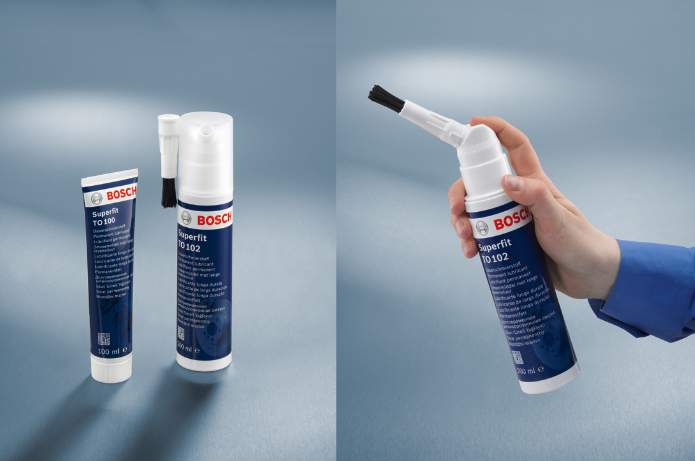Brake lubricant
Disc and drum brakes can only offer optimum performance if the brake pads/brake shoes are mounted with a certain amount of movement. To achieve this and thus safeguard performance in the long...
Function
Disc and drum brakes can only offer optimum performance if the brake pads/brake shoes are mounted with a certain amount of movement. To achieve this and thus safeguard performance in the long term, garages use non-conductive permanent lubricants when repairing disc and drum brakes. When repairing disc brakes, the guides and contact points for the brake pads, for example, or, depending on the type of brake calliper, its guides too, are lubricated with a permanent lubricant. In the case of drum brakes, permanent lubricant is applied where the brake shoes make contact with the brake anchor plate and the shoe mount, for example.

Permanent brake lubricants are designed not only to provide long-term protection against corrosion for the moving parts of disc and drum brakes and to ensure that they retain freedom of movement. They also prevent noise generation during braking.
Lubricants containing copper
However, lubricants containing copper must not be used when repairing brakes. Their electric conductivity encourages electrochemical corrosion. Depending on external influences, this can result in brake components becoming sluggish after a relatively short period. Corrosion and pasting hinder the return travel of the brake pads when the brake is released, leading to noise and increased wear. Furthermore, lubricants containing copper can cause resonant vibration, also resulting in noise generation during braking.
High-quality brake lubricants
 High-quality brake lubricants have numerous benefits for noise-free and safe braking over a long service life. They are characterised by
High-quality brake lubricants have numerous benefits for noise-free and safe braking over a long service life. They are characterised by
- electrical neutrality
- extremely low oil separation
- low tendency for pasting
- high erosion resistance
- insensitivity to heat and cold.
Using of brake lubricant
Metal-free permanent lubricants from well-known manufacturers can be used for steel and aluminium brake callipers as well as for vehicles with ABS. Permanent lubricants are also suitable for other applications:
- Mounting and protection of compressors
- Central lubricating systems
- Seat rails
- Guides for sliding/tilting sunroofs
- Retaining straps
- Battery poles
- Axle bearings
Safety
The brakes are one of the most important safety systems of a vehicle. Unbeknown to the driver, they are applied and released hundreds if not thousands of times a day. The driver usually only brakes consciously if braking does not follow the usual procedure. Lubricants ensure that brakes remain in good working order in the long term. They also prevent the development of unpleasant odours during braking.
Environmental protection
High-quality brake lubricants contain no copper, heavy metals or acids. Unlike copper pastes, they thus help to protect the environment and safeguard the ability of the brake to perform the function for which it was intended.
Depreciation
Permanent lubricants are not conductive. Therefore, they prevent corrosion of metal parts and most rubber materials. The use of a permanent lubricant thus prolongs the service life of the components of disc and drum brakes and reduces the need for repairs.












